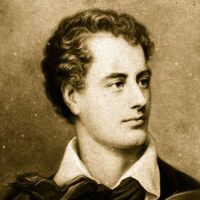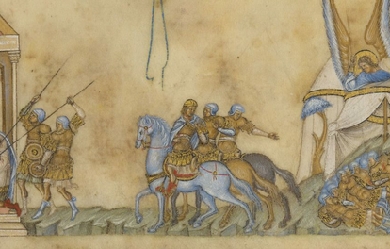To Edward Noel Long, Esq.
‘Nil ego contulerim jucundo sanus amico.’~Horace.
Dear Long, in this sequester’d scene,
While all around in slumber lie,
The joyous days, which ours have been
Come rolling fresh on Fancy’s eye;
Thus, if, amidst the gathering storm,
While clouds the darken’d noon deform,
Yon heaven assumes a varied glow,
I hail the sky’s celestial bow,
Which spreads the sign of future peace,
And bids the war of tempests cease.
Ah! though the present brings but pain,
I think those days may come again;
Or if, in melancholy mood,
Some lurking envious fear intrude,
To check my bosom’s fondest thought,
And interrupt the golden dream
I crush the fiend with malice fraught,
And, still, indulge my wonted theme.
Although we ne’er again can trace,
In Granta’s vale, the pedant’s lore,
Nor through the groves of Ida chace
Our raptured visions, as before;
Though Youth has flown on rosy pinion,
And Manhood claims his stern dominion,
Age will not every hope destroy,
But yields some hours of sober joy.
Yes, I will hope that Time’s broad wing
Will shed around some dews of spring:
But, if his scythe must sweep the flowers
Which bloom among the fairy bowers,
Where smiling Youth delights to dwell,
And hearts with early rapture swell;
In frowning Age, with cold control,
Confines the current of the soul,
Congeals the tear of Pity’s eye,
Or checks the sympathetic sigh,
Or hears, unmov’d, Misfortune’s groan,
And bids me feel for self alone;
Oh! may my bosom never learn
To soothe its wonted heedless flow;
Still may I rove untutor’d, wild,
But ne’er forget another’s woe.
Yes, as you knew me in the days
O’er which Remembrance yet delays
And even in age, at heart a child.
Though, now, on airy visions borne,
To you my soul is still the same.
Oft has it ben my fate to mourn,
And all my former joys are tame:
But, hence! ye hours of sabl hue!
Your frowns are gone, my sorrows o’er:
By every bliss my childhood knew,
I’ll think upon your shade no more.
Thus, when the whirlwind’s rage is past,
And caves their sullen roar enclose,
We heed no more the wintery blast,
When lull’d by zephyr to repose.
Full often has my infant Muse
Attun’d to love her languid lyre;
But, now, without a theme to choose,
The strains in stolen sighs expire.
My youthful nymps, alas! are flown;
E—is a wife, and C—a mother,
And Carolina sighs alone,
And Mary’s given to another;
And Cora’s eye, which roll’d on me,
Can now no more my love recall -
In truth, dear LONG, 'twas time to flee -
For Cora’s eye will shine on all.
And though the Sun, with genial rays,
His beams aike to all displays,
And every lady’s eye’s a sun,
These last should be confin’d to one.
The souls’ meridian don’t become her,
Whose sun desplays a general summer!
Thus faint is every former flame,
And Passion’s self is now a name;
As, when the ebbing flames are low,
The aid which once improv’d their light,
And bade them burn with fiercer glow,
Now quenches all their sparks in night;
Thus has it been with Passion’s fires,
As many a boy and girl remembers,
While all the force of love expires,
Extinguish’d with the dying embers.
But now, dear LONG, 'tis midnight’s noon,
And clouds obscure the watery moon,
Whose beauties I shall not rehearse,
Describ’d in every stripling’s verse;
For why should I the path go o’er
Which every bard has trod before?
Yet ere yon silver lamp of night
Has thrice perform’d her stated round,
Has thrice retraced her path of light,
And chased away the gloom profound,
I trust that we, my gentle Friend,
Shall see her rolling orbit wend,
Above the dear-loved peaceful seat,
Which once contain’d our youth’s retreat;
And then, with those our childhood knew,
We’ll mingle in the festive crew;
While many a tale of former day
Shall wing the laughing hours away;
And all the flow of souls shall pour
Tha sacred intellectual shower,
Nor cease, till Luna’s waning horn
Scarce glimmers through the mist of Morn.


